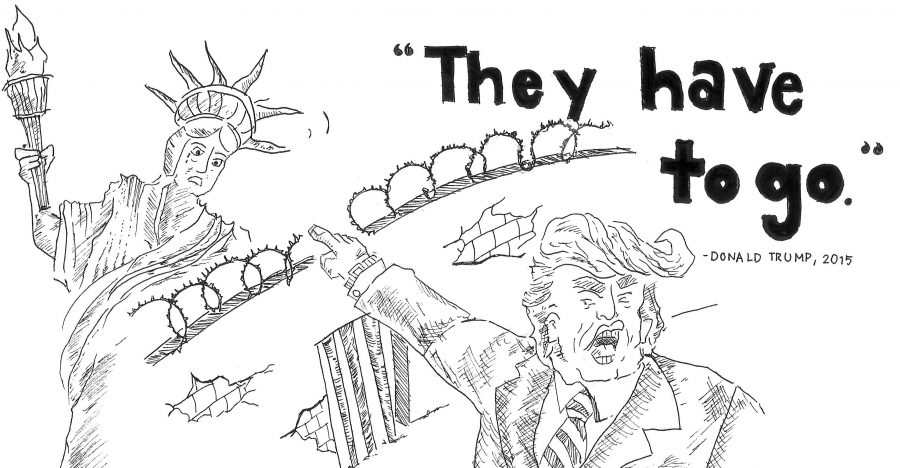Donald Trump’s America: The 2016 Presidential Election through an Immigrant’s Eye
Credit: Lei Anne Rabeje
October 23, 2016
The pursuit of the American Dream leads some people thousands of miles from their home. Immigrants hail from around the world attracted by prospects of wealth, safety, and better opportunity for their children. Whether documented or undocumented, all immigrants have paid the price of thousands of dollars, discrimination, and displacement in search of the American Dream.
I came to the United States when I was eight years old in pursuit of the very same dream — the white picket fences, the suburban home, and the green yard. Like many before me and many after, I was attracted by its multitude of opportunities but terrified of the racist remarks circling in the media, and most recently, the presidential election.
It has been scary to watch the 2016 presidential election unfold over the past year. Immigration is amongst the most debated issues in the election as Republican nominee Donald Trump promotes his anti-immigrant stance. Perpetuating American history of nativism and fear of immigrants, Trump’s anti-immigrant rhetoric and Islamophobia has managed to alienate many traditionally Republican voters.
As the presidential election unfolds, Trump manages to entice his audience with radical nationalist opinions and policies. From proposing to build a wall between the U.S. and Mexico border to banning Muslims from entering the United States, Donald Trump instigates racism and hate crimes towards certain groups of people.
A new report from California State University-San Bernardino’s Center for Study of Hate and Extremism suggests that Trump’s Islamophobic stance has fueled hate crimes of unseen levels since the September 11, 2001 terror attacks. Aside from calling a ban to Muslims, Trump has also accused American Muslims of protecting terrorists, claiming that “[American Muslims] are protecting each other.” How are Muslims supposed to feel secure in a country where a presidential nominee accuses them of dishonesty and terrorism?
Yet it remained difficult to understand the hurt behind Trump’s words and empathize with those he attacked until he suggested a ban on Filipino immigrants. In August 2016, Donald Trump proposed barring entry into the United States from Afghanistan, the Philippines, and Yemen — a few of the many countries he labeled as “terrorist nations.”
I was born and raised in the Philippines. I watched as my parents, my sister, and my family friends struggle to speak English, assimilate into the American culture, and face the constant taunts to “go back to [their] country.” To hear Trump’s negative portrayal of immigrants is offensive and dismissive of the hard work my parents, my family friends, and my fellow immigrants placed to build a more comfortable life.
Senior Bujana Mulosmani immigrated to the United States at six years old from Albania, a predominantly Muslim country. “Trump’s propositions are hurtful and discouraging,” said Bujana, “When people think of America, it’s supposed to be the land of opportunity for everyone, whether they are a native, immigrant, rich, or poor.”
America is the land of opportunities, but the opportunities seem to narrow themselves as the election unravels. Once a haven of wealth and prosperity, Donald Trump’s United States now instills fear and vulnerability to many families. Will Donald Trump change his stance in the near future? Will America be safe again?

